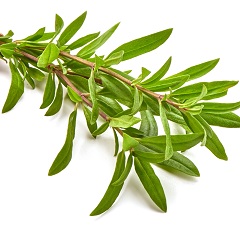
Medicine:
Use: Used for bronchitis, whooping cough, sore throat, colic, arthritis, upset stomach, stomach pain (gastritis), diarrhea, bed wetting, a movement disorder in children (dyspraxia), intestinal gas (flatulence), parasitic worm infections, and skin disorders
Thyme is any member of the genus Thymus of aromatic perennial evergreen plants to 40 cm tall in the mint family Lamiaceae, native to temperate regions in Europe, North Africa and Asia. Thymes are relatives of the oregano genus Origanum. They have culinary, medicinal, and ornamental uses, the species most commonly cultivated and used for culinary purposes being Thymus vulgaris.
Its stems tend to be narrow or even wiry; leaves are evergreen in most species, arranged in opposite pairs, oval, entire, and small, 4–20 mm long, and usually aromatic. Thyme flowers are in dense terminal heads with an uneven calyx, with the upper lip three-lobed, and are yellow, white, or purple.
The flowers, leaves, and oil are used as medicine. Thyme is sometimes used in combination with other herbs. The main active ingredients of Thyme are the essential oils although contain other substances.
Essential oil (Thymus vulgaris 1.5-2.5%, Thymus zygis 0.3%) of variable composition depending on the type of plant, the components in largest amounts are the thymol and/or carvacrol, and other quantities of geraniol, terpineol, linalool, trans-tuyanol-terpineol. Flavonoids are derivatives of apigenol and luteolol, Phenolic acids are caffeic, rosmarinic, Abundant tannins (10%) and Saponosides.
Thyme is taken by mouth for bronchitis, whooping cough, sore throat, colic, arthritis, upset stomach, stomach pain (gastritis), diarrhea, bed wetting, a movement disorder in children (dyspraxia), intestinal gas (flatulence), parasitic worm infections, and skin disorders. It is also used to increase urine flow (as a diuretic), to disinfect the urine, and as an appetite stimulant. Some people apply thyme directly to the skin to act as a counterirritant, for hoarseness (laryngitis), swollen tonsils (tonsillitis), sore mouth, and bad breath. Thyme oil is used as a germ-killer in mouthwashes and liniments. It is also applied to the scalp to treat baldness and to the ears to fight bacterial and fungal infections. Thymol, one of the chemicals in thyme, is used with another chemical, chlorhexidine, as a dental varnish to prevent tooth decay.
Thyme contains chemicals that might help bacterial and fungal infections, and minor irritations. It also might relieve smooth muscle spasms, such as coughing, and have antioxidant effects.